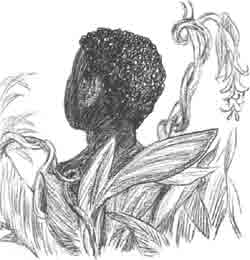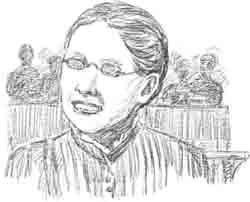Once Jesus’ disciples asked Him, “What shall we do, that we might work the works of God?” Jesus replied, “This is the work of God, that ye believe on him whom he hath sent.” (John 6:28-29) God’s great purpose was to send His Son to deliver men from sin. But would men receive Him and believe on Him? Many did not.
To those who will listen, God is still asking the same question. It does not matter whether you are educated in a special school or have been raised in a jungle tribe. It doesn’t depend on your religion, or how good you have been—or how bad—nor if you are dark or light, rich or poor, boy or girl. The question still is
Will You Believe on Him?

The dark-skinned boy was quiet as he walked the jungle trail. His mind was filled with strange new thoughts. All his life he had heard the stories of his people: the bravery of their warriors, the skill of their hunters, and the sad, sad story of how they had been deceived and lost God. No one talked about it much, but it was in times of trouble that they all felt it. When they called for Him, God did not come to help them. They were lost and without hope. But now the young boy had heard a strange new story.
What was it? That God had made Himself small, like an ant, and walked as a man on earth. His name was Jesus Christ, and He had come to show them God’s trail so that they could find Him again. That was wonderful news, but his tall friend wasn’t finished with the story. They had murdered Jesus Christ. Now they had surely lost their only chance to know God! But it was Christ’s blood that had been used to hide their sin, just as the hunters always used the animal skin to keep out the voices of evil spirits.
The boy looked up into the canopy of leaves and vines overhead. There were many spirits in the jungle. Spirits to be afraid of, and spirits to listen to. There were many trails in the jungle, too. Which was Jesus Christ’s trail? No one in his tribe had ever walked it before. Who could show him how to walk on it? He must ask his tall friend when they sat around the fire tonight.
“Remember the Feast of the Arrows, Bobby, and how I was afraid to climb into the hammocks to sing?” his friend said. “I wanted to keep one foot on the ground.”
Bobby nodded. “Yes, and I said you had to have both feet in. You had to hang in the hammock and let it hold you up,” he said, a grin spreading over his brown face.
“That is the way you must follow Jesus,” his friend continued, as the firelight danced on their faces. “No one else can show you His trail. Only Jesus can. You must hang your own hammock strings on Jesus and trust God to hold you up.”
In the darkness of the night Bobby thought about what his friend had said. He thought about it as he lay swinging gently in his hammock. How can I hang my hammock in Jesus Christ? he thought. I can’t see Him or feel Him. But I want to know the way to God and He’s the one that can show me.
The next day as Bobby walked the trails that he knew so well, he felt the warm steamy air and the soft soil beneath his feet. The jungle was alive with whirring insects and parrots calling to one anther, but Bobby was not listening to them. His mind and heart were calling for Jesus Christ. Bobby knew that He was there, though he couldn’t touch Him or hear Him. His friend had said that it was God’s Spirit that could show him the way.
Suddenly Bobby stopped. “Jesus Christ, I want to walk Your trail—not my own trails anymore,” he said, stretching out his arms. “I want to tie my hammock strings in You and learn Your language.” It was then that a great peace filled his heart and it seemed that Someone stood very close to him. Bobby’s dark face broke into a smile and he felt like shouting. Yes, he now had a new language to speak—a whole new life. Jesus Christ had come to walk the trail with him.
—The true story of Bobby, a Motilone of Columbia, can be found in Bruchko, by Bruce Olson
Fanny was blind. But that didn’t bother her much. She had learned to listen to the sounds around her to know where she was. She could tell people apart by their step and voice. Right now a young man was leading her to a seat in the church where a revival was being held. She smiled as she sat down and listened to the singing. But inside she was not smiling.
Why wasn’t she happy? Fanny was now a teacher at the blind school where she had come as a young girl. She wrote poems and a book of them had been published. Her songs were being sung around the country. She had come to great success, even though she could not see. Why didn’t she have peace inside?
Fanny had tried to seek God. Two times she had gone down to the altar after the meeting and prayed. She wanted to be right with God and have peace, but she couldn’t make it happen.
Ever since she was a little girl, there had been an empty spot inside. Fanny thought if she could study like other children, she could be happy. Maybe if she could be a poet and do something important the empty spot could be filled. But it wasn’t. All the trying and learning hadn’t helped.

Now Fanny listened carefully as the preacher spoke about God’s grace and mercy. The penalty for sin was death, and Jesus had come to pay that price for us. She had heard that many times. But how did that help her?
As she went forward to pray one more time, she thought about the song everyone was singing: “At the cross, where I first saw the light and the burden of my heart rolled away!” Fanny wanted that. Her heart felt heavy all right. Suddenly she listened to the last verse.
“Here, Lord, I give myself away,
’Tis all that I can do.”*
To give herself? To just trust God to make her happy and believe that He could? Fanny, the teacher and song writer, liked to do things herself. She didn’t like others to help her. But that was what she must do. She must let go of her own ways and let Jesus lead her.
With a smile filling her heart, Fanny joined in the song: “It was there by faith I received my sight, And now I am happy all the day!”
—This true story is taken from Of Fanny Crosby and the Light, her biography by Sandy Dengler
The little girl in the sari dashed the tears from her eyes and tried to smile. She was leaving her big sister and the kind people at the mission. She was leaving because Father was angry and didn’t want her to stay. “One curse in the family is enough!” he had growled when she had begged to listen some more.
“Oh, but Father,” she had plead, “can’t I learn a little more and then come home? Please, Father!”
She clung to his hand, but he shouted, “Just look at your sister! One shame is enough, I say!” The dark eyes filled with tears and spilled over. But Father was not impressed. “We must go,” he said, and she was led off down the street. Would she ever get to come back? The dark head lifted and the little girl turned for one last look.

She had heard a little and it had been all so beautiful. Like the blue over her head and the bright flowers in the courtyard. As she walked by her father’s side, the little Hindu girl thought about the God that had made them all. And He loves me and will be my Father, she remembered, with a flood of happiness. How wonderful that He is everywhere and can do everything!
“Why, Mimosa! What is the matter with you?” said her mother the next morning, as the little girl turned away from the holy basket. Siva’s ashes were in it. Siva, the Hindu god whom they all honored. Mimosa shook her head. She could not smear the ashes on her forehead now.
They thought is was a silly idea that would soon leave her. But somehow she could not look at those white ashes as she had before. Siva was not her God. Mother grew angry and her sisters scolded.
“She has been bewitched by the white people!” said her aunt.
“No, she is spoiled,” cried her mother. “She must learn to obey.”
“Like the help of the rod, what help is there?” said her aunt. So Mimosa felt the sting of the stick and was punished for her naughtiness.
But the wonderful Love, whom she knew so little about, had charmed her. Her family scorned her and no one else cared, but the Love of God had won her heart. She could not forsake Him. Though she was beaten for it, yet He was her God and she would believe in Him.
—The true story of this Indian girl is told in the book Mimosa, by Amy Carmichael
To an uncivilized Columbian boy the question was settled on a jungle trail. For the blind poet, who had learned to conquer life alone, the call was answered when she yielded at a church altar. And the little Hindu girl gave her response when she refused to smear on Siva’s ashes. They believed on Him as their Savior and Lord, and were called the children of the living God.